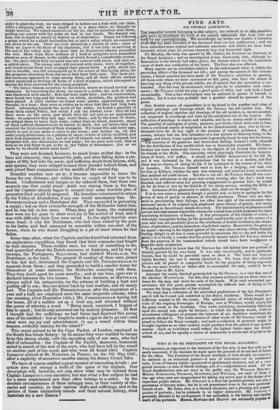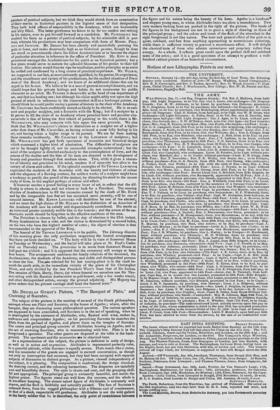WHO IS TO BE PRESIDENT OF THE ROYAL ACADEMY?
THIS question, so important to the interests of the fine arts, is one that will not be easily answered, if the decision be made upon the grounds of desert and of fitness for the office. The President of the Royal Academy of Arts should, we conceive, be eminent as an historical painter—a man of education—of an intellectual taste, if not of literary habits—possessed of gentlemanly manners, and of a com- petent income—a man of liberal feelings, and of a comprehensive mind. Of the Royal Academicians who are most in the public eye, Sir WILLIAM BEECHEY, Messrs. NOSTRUM, THOMSON, STOTHARO, and WESTALL, are each of them it that age when men are incapacitated for taking any active part in the duties den important public station. Mr. PHILLIPS is a first-rate portrait-painter, and also a gentleman of literary taste; but be is not preeminent even in his own particular branch of art. Mr.SHEE, also, is a literary character, and a pleasing and popular painter of portraits ; but he pretends to no higher distinction. Mr. JACKSON. 15 generally allowed to be unsurpassed, if not unrivalled, in the fidelity and sterling merit of his portraits. Messrs. HOWARD and Llu.rox are eminently popular AS painters of poetical subjects, but we think they would shrink from an examination of their merits as historical painters in the highest sense of that designation. They both hold offices of responsibility in the Academy, which are honourably and ably filled. The latter gentleman we know to be far too modest and retiring In his nature, ever to put himself forward as a candidate. Mr. PICKERSOILL has exalted his fame as a painter of poetical subjects, by his admirable skill in por- trait, wherein his productions may bear comparison with those of Messrs. Na- mes and JACKSON. Mr. BRIGGS has been silently and successfully pursuing his path to fame, and ranks deservedly high as an historical painter, though ha does not stand so preeminently above his fellow Academicians as to become the object of particular attention in reference to the office of President. Mr. Erre is most prominent amongst the Academicians for his merit as an historical painter; but a few years would serve to mature the splendid blossoms of his genius to their full fruition. His talents would then be ripe for exaltation, and his principles as an artist be settled and confirmed by a long course of practical experience. Mr. Wave, we suggested in our last, as most eminently qualified, by his genius, his experience, and the excellence and variety of his productions, for the exalted situation of Presi- dent of the Royal Academy ; and we know of no additional claims that can be urged in his favour. We believe he is a man of general accomplishments, and we should hope that his private feelings and habits do not coetravene his public character as an artist. Mr.TURNER is deservedly at the head of one department of art, and that isa leading one; but although his claim imightsafely rest upon the high ground of merit in reference to his transcendent skill as a landscape painter, we should think he would prefer seeing a painter of history in the chair of the Academy. Mr. CHANTREY has been confidently named as likely to be elected. He is an emi. nent and popular sculptor, and a favourite with the King; but if a sculptor be a tit person to fill the chair Of an Academy whose proudest boast and peculiar cha- racteristic is that of being the first school of painting' in the world, there is Mr. Wes-cm:worts who may compete with him upon the same grounds. We also think that Mr. Wesvatacorr's claims to distinction as a sculptor are of a higher order than those of Mr. CHANTREY, as having evinced a more lofty feeling in his art, and having taken a higher range in its pursuit. We are far from making these remarks invidiously. Mr. CHANTREY is the LAWRENCE Of SCUlptOrS• but Mr. WESTMACOTT has put forth specimens of invention and historical design which command a higher kind of admiration. The difficulties of sculpture are not to be thought lightly of, nor its successful triumphs undervalued ; but the mind of the sculptor is directed exclusively to the contemplation of form, and the course of his studies and the bias of his taste are directed to the development of beauty and grandeur through that medium alone. This, while it gives a charac. ter of identity and precision to his mind, renders it of necessity less alive to the variety of charm and colour. If the splendid examples of SirTHOMAS LAWRENCE captivated the students of the Academy with the beauty and richness of colour and the elegance of a flowing contour, the noblest works of a sculptor might have a tendency to petrify the pencil of the student, by directing his mind to the severe study of form, to the neglect perhaps of colour and effect. It however excites a proud feeling in every lover of art, to reflect that the dif- ficulty is where to choose, and not where to look for a President. The ensuing election of Academicians to fill the vacancies caused by the death of Mr. Daum and by the irreparable loss that art has sustained more .recently, will be one of unusual interest. Mr. EDWIN LANDSEER wilt doubtless be one of the elected; and we trust the high claims of Mr. HAYDON to the distinction of an Associate of the Academy will now be calmly and dispassionately considered. His merits as an historical painter certainly entitle him to the honour; and the errors of the en- thusiastic youth should be forgotten in the effective exertions of the man.
The President is chosen by ballot, and the day of election is the 25th instant. Every Academician has a vote, and the choice is determined by a second ballot, on the two who have the highest number of votes ; the object of election is then recommended to the approval of the King.
The funeral of Sir THOMAS LAWRENCE is to be public. The Literary Gazette of this morning gives the only particulars respecting the funeral arrangements
that have yet been decided on. "The body will lie in state at Somerset House en Tuesday or Wednesday ; and the burial will take place at St. Paul's Cathe- dral on Thnrsday next. The procession is to move from Somerset House at half.past ten o'clock ; and it is supposed that the ceremony will occupy at least four hours. The arrangement embraces the family relatives of the deceased, the Academicians, the students of the Academy, and noble and distinguished persons
to close the line. The,ssite selected for his last resting-place is in the vault be- neath the south aisle, in the immediate vicinity of the grave of Sir Christopher Wren, and only divided by the late President West's from that of Sir Joshua.
The remains of Opie, Barry, Dawe, (at whose funeral we ourselves saw Sir Tho- mas acting with the Russian Ambassador as pall-bearer, only a few weeks since), and other distinguished artists, occupy the ground adjoining. His Majesty has given orders that his private carriage shall head the funeral train."



















 Previous page
Previous page